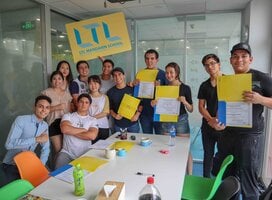Study Abroad Programs in Tokyo, Japan
Tokyo is said to be one of the world’s most rapidly growing metropolitan areas. Being the capital of Japan, it is home to not only the government seats but also the Imperial family. Tokyo has been described as a commanding force of the world economy, so students who study abroad here will be in the heart of a truly and internationally influential city.
As one of the most robust cities on the planet, Tokyo enjoys state of the art technology, unique and upscale eateries, and exquisite parks and gardens. Luckily, it won't take you long to get from place to place - the city is equipped with an easy to use subway system that prides itself on efficiency. From sushi stands to temples, Tokyo has something that will interest all types of students (from shopaholics to history buffs to anime lovers!). Tokyo successfully preserves its old world traditions without sacrificing modernity and a fast-paced vibe.
Two articles we recommend reading next are: What to Know Before Studying Abroad in Japan, and How Much Does it Cost to Study Abroad in Japan? After that come back here to continue exploring program options!
Culture and immersion
Tokyo is packed from end to end with awesome sights to see and things to do. Do NOT (we repeat, do NOT!) study abroad in Japan without paying a visit to Mt. Fuji (which can conveniently be reached by bus, so no excuses!). Athletic students who are looking for a challenge may even embark on the five-hour climb to the summit of the 12,388-foot high Mt. Fuji. Others may be more up for riding a cable car to the top - either way, the view is stunning.
Those students interested in visiting one of Tokyo’s beautiful parks must go to the Imperial Palace East Garden. The garden is complete with a 19th century Tea Pavilion on one end and a Moat of Swans in the inner circle. This park would make a great location for lazing away an afternoon with your snack of choice (octopus balls, anyone?)
The Tokyo Tower is hard to miss as it jets high up into the sky and glows by day and by night. The warm orange glow of the tower is reserved for only those who see it with the naked eye - and is not to be missed! To get a deeper insight into Japanese popular culture, students should visit the Studio Ghibli and the Tokyo National Museum. Studio Ghibli is famous for its production of anime films, which are a huge part of Japanese culture (best to stock up on your manga before you arrive!).
Affordability
Japan is one of the most expensive Asian countries, but fear not - there are definitely ways students studying abroad can make it affordable. For transportation, students should consider buying a SUICA card, which will give you access to the rail lines and subway around Tokyo. The subway costs 2000 yen per ride no matter how far you are traveling. For your dining options, know in advance that most of the sit-down restaurants in Tokyo are on the more expensive side. You won't have to starve though - along the streets and at most of the markets, there are inexpensive food stands that serve up quality (and fresh) food. Eating from the more casual food stands is also a great idea because you will be able to try a wide array of different authentic Japanese dishes in one meal.
For more budget tips we recommend reading How Much Does it Cost to Study Abroad in Japan? and How to Study Abroad in Japan on a Budget.
Culture shock and support
Going abroad is such a new and different experience, so it is really important to choose an abroad program that provides adequate support and comfort from culture shock.
CIEE, for example, organizes a seminar on living and learning abroad, which prepares students for the journey that they are about to embark on. It informs students on the country’s culture and values, as well as helps them shape a mindset in which they should enter the country with.
Similarly, IES Abroad prepares students with an orientation upon arrival, and also has staff readily available at all times for students. Whether students are homesick, having trouble with school, or just want to chat with a friendly face, the IES staff is always happy to help.
Insider tips:
A place that you wouldn’t find in most travel guides, but is definitely worth going to, is the Tsukiji Fish Market. Located right outside the city, this is the largest fish market in the world and has stands selling everything from octopus to massive tunas. This market is not only extremely interesting to explore, but also a great place to grab a meal. There are countless stands serving up fresh caught fish and sushi.
The basement food halls at department stores are a really interesting dining experience. Almost all the food is pre-prepared and beautifully displayed behind glass. It is really cool to see the vast array of different things that are being offered before you make a decision on what to buy.
The tap water in Japan is okay to drink, so to save money, be sure to pack your own water bottle! In this way, you can fill it up as you go and avoid the high costs (and wastefulness) of bottled water.
Because studying abroad is an expensive process, it is great to know your scholarship options!
- The JASSO scholarship is funded by the Japanese government and available to students studying abroad for one year in Japan.
- The Bridging Foundation offers a scholarship for study abroad in Japan for American undergraduate students majoring in any field of study. Awards range from $2500-$4000 and are not applicable for summer programs.
- The Freeman-Asia award provides needs-based funding to American students studying in Japan for semester, year, or summer programs.
- More Study Abroad Grants and Scholarships

































